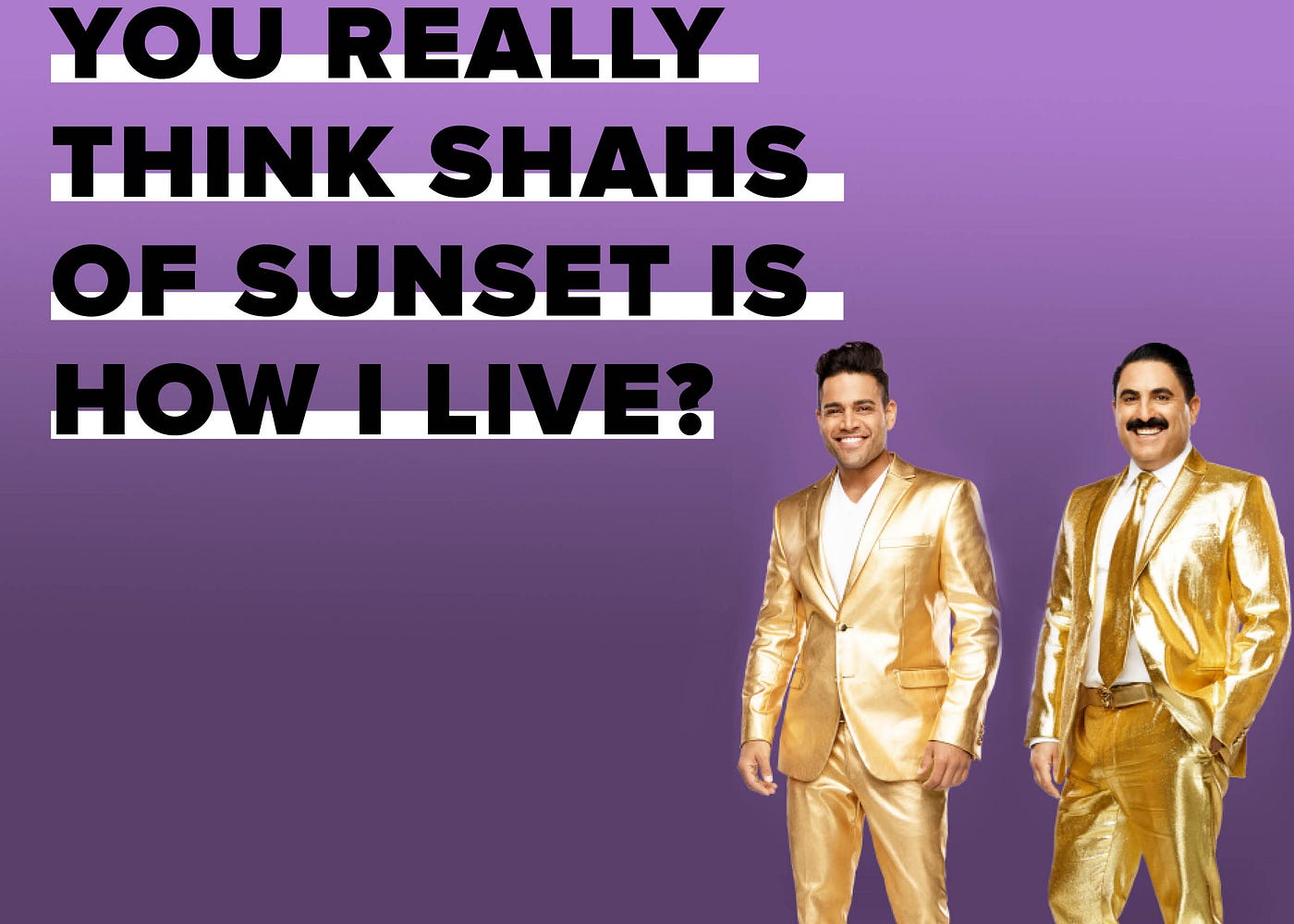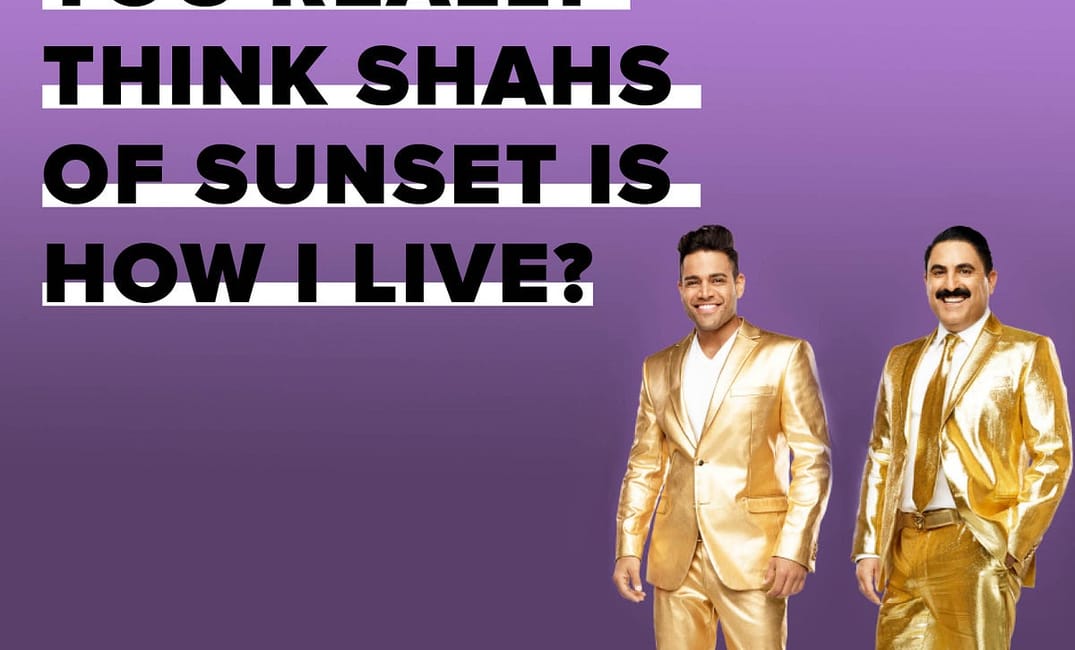By Shideh Etaat

By Shideh Etaat
Despite what reality TV may be telling you, there are no Shahs on Sunset Boulevard. There was a Shah, and he lived in Iran and was ousted from his throne during the 1979 Islamic Revolution. As an Iranian American, I can say with complete certainty that there are no actual kings and queens left among us, that unlike the popular Bravo show Shahs of Sunset, we don’t all drive a Mercedes and spend way too much money on our dogs’ birthdays or throw shit fits when our friends tell us that maybe we should skip that chocolate croissant.
I watched a couple of episodes of Shahs of Sunset during season 1, but I had to stop. There were no story lines, and watching the show made me feel shamefully guilty. But Shahs of Sunset refuses to leave my life, because people in San Francisco think they know me through the lens of the series.
Usually, when I meet someone new here, they’ll ask me if I’m Indian or Latin (before butchering my name). Since the Bravo series started airing, though, strangers are now curious if I’m Persian; and when I say yes, their response always links back to Shahs of Sunset. It happens when I’m ordering coffee, when I’m at parties, everywhere.
My fiancé is also asked stereotypical questions all the time at work when he mentions that he’s marrying a Persian from LA. “Is her family loaded?” “Is she as spoiled as the girls on that show?” I’ve always wanted Persians to be recognized as a people, but not like this. Being from LA, I can say that these kinds of queries are far less likely to happen in a city inhabited by over 800,000 Iranians. People in LA may watch Shahs of Sunset, but they experience Iranians on a daily basis and have a greater spectrum of what one might look and sound like. Their grocer might be Iranian, their lawyer, their mother-in-law. But in a city like San Francisco, where we are fewer and far between, this show does some serious damage to our tribe.
I don’t completely blame this city’s ignorance about Persian culture on Shahs of Sunset;or the producers, who saw a new ethnic niche for reality TV and went for it. The third season of the Bravo hit ended this week, and I can see how people get hooked on the drama of it all. It’s reality TV, after all; it’s not supposed to educate, but rather to give watchers’ brains the night off.
I’m not asking people to stop watching Shahs of Sunset, but if they’re going to use it as a reference point for an entire culture, they should do some further research about Persians. I know everyone’s busy, and some folks would rather take the easy route with stereotypes, so let the following serve as a brief guide to Persian culture, elements of which probably won’t make it on the air.

Our literature spans over two and a half millennia. We were writing poems before some cultures even knew how to speak. Ever heard of Rumi or Hafiz? Yep, they were Persian, and although they talk about drinking lots of wine, they always kept it classy. If you want to read the work of a true Iranian bad-ass feminist, look up Forough Farrokhzad; she was getting frisky long before booty calls were a thing.


We take our meals seriously. Whether it’s herbed stew with celery and beef, rice with cherries, or traditional ground beef kabob koobideh, it’s difficult to go wrong with Persian cuisine. Although nothing beats mother’s cooking, there are some restaurants in San Francisco that come close. One of my favorites is Lavash in the Sunset District. Run by a husband and wife duo, this dimly lit, cozy restaurant serves the finest in Persian cuisine. Don’t forget to ask for tahdig, or the crispy rice found at the bottom of the pot, topped with your selection of stew.


The first day of spring is also known as Persian New Year, or Norooz, which literally means “new day.” It’s celebrated on the day of the Northward equinox and has its roots in Zoroastrian traditions. A couple of weeks before it happens, every Persian household begins to reek as we set up the haft seen, or the table with the seven objects whose names begin with letters that are linked to something we’d like to accomplish in the new year. The night before, we partake in some real samurai activities and jump over fire to wash away all the gunk from the year before.


It’s true. Many Iranian films are depressing as shit, but that doesn’t mean much at all. Our movies are heartfelt and capture unique stories and perspectives. We even won the Oscar two years ago for A Separation, a film by Asghar Farhadi, whose new film, The Past, is out now. There’s something subtly powerful about his films, which is safe to say about most Iranian filmmakers. It’s not about the glitz and the glamour, but rather the shared humanity of our stories. For something a little more risqué, check out Maryam Keshavarz’s Circumstance, winner of the 2011 Sundance Film Festival Audience Award, about a lesbian romance in Iran that could, alas, never be.

I’m not sure how many more seasons Shahs of Sunset has going for it. I don’t have control over head producer Ryan Seacrest and his brilliant ideas, but I do have control over my reactions to it — and perhaps can even create an awareness of my culture beyond the flashy gold tuxedos, the drinking problems, and the shallow ways of those who deem themselves the kings and queens of anything.







